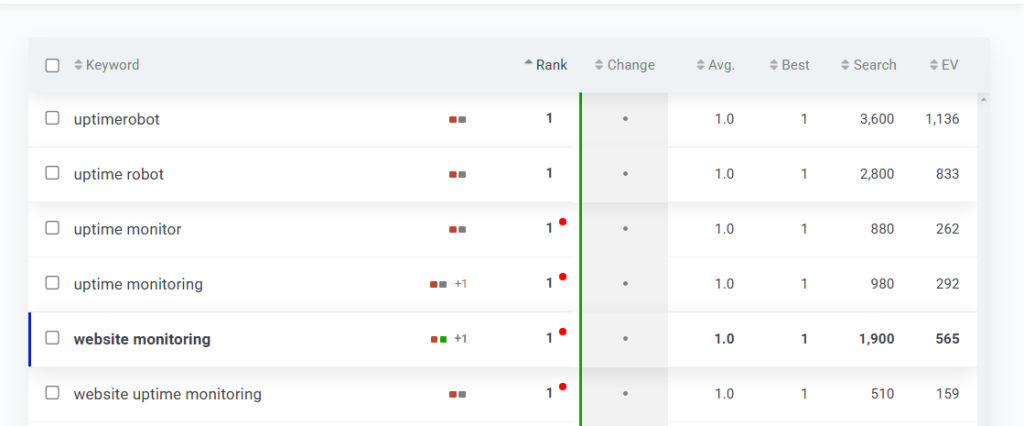Search intent is one of the most crucial pillars in SEO and keyword research.
If you don’t understand why users are typing certain keywords into Google, how can you know what kind of pages and content you should be creating and optimizing?
In this article, we’ll explore:
- What is search intent
- Types of search intent
- The importance of search intent
- How to analyze search intent
- Optimization strategies for search intent
Are you ready? Let’s dive right in!
What is search intent?
Search intent (also called “user intent” or “keyword intent“) refers to the goal a user has when typing keywords into a search engine. Search intent can be divided into four basic categories: informational, commercial, transactional, and navigational intent.
Think of it this way—why did the user choose those particular words for their search? Are they looking for an answer to a question? A definition of a word? Do they want to buy a product? Or are they trying to find a specific website they already know?
For example, if a user types “best coffee machines” into Google Search, the intent behind their query is commercial, as they are likely looking for review and comparison pages about various coffee makers.
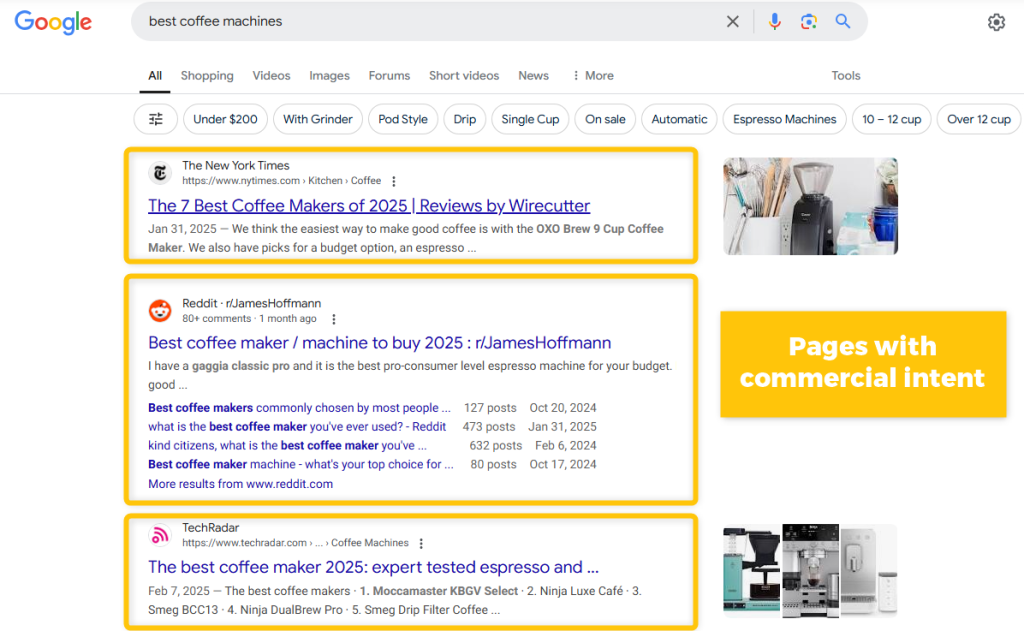
Types of search intent
Search intent behind keywords can be divided into 4 major categories:
- Informational intent
- Commercial intent
- Transactional intent
- Navigational intent
| SEARCH INTENT | WHAT IS IT USED FOR? | EXAMPLE |
| Informational | To find new information | “how to write better content” |
| Navigational | To get to a specific online property | “Mangools blog” |
| Transactional | To find and buy products | “buy asus laptop” |
| Commercial | To research future purchases | “best laptop for students” |
In addition, there are various exceptions (e.g., mixed or local intent) where it is not always clear what users are looking for when typing keywords into Google Search.
Let’s take a closer look at each type of search intent individually.
Informational intent
Informational keywords account for the majority of searches on Google. These queries typically indicate that the user is seeking information on a particular topic, product, or service.
People often search for answers to questions, definitions, general knowledge about entities, opening hours, weather forecasts, and more.
Typical examples of informational queries include:
- “London weather”
- “Stephen King biography”
- “How to bake muffins”
- “What is blockchain?”
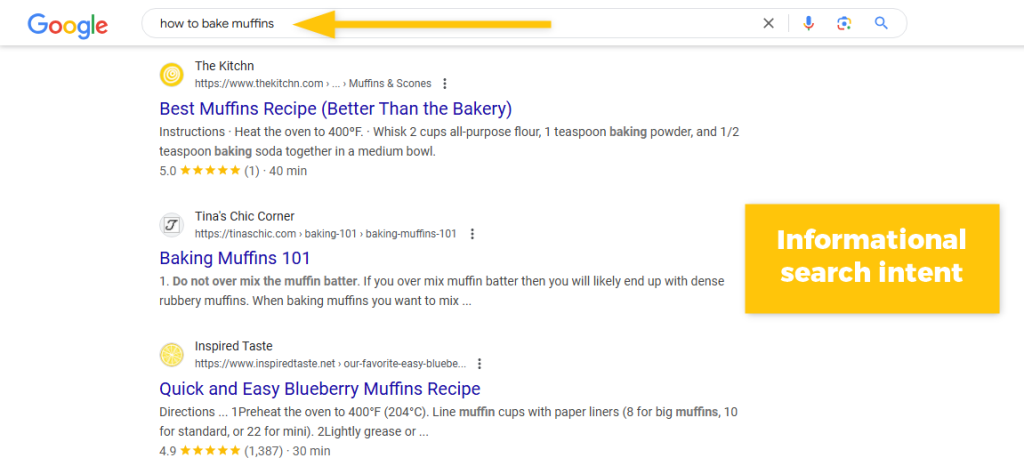
💡 Key takeaway: Informational intent is usually the first stage in a user’s journey, where they are looking to educate themselves before moving to the next step. Content for informational intent should provide valuable, detailed, and well-researched information to answer users’ questions.
Commercial intent
Commercial intent keywords are often used by users who are researching products or services with the intention of making a purchase in the near future.
These searches typically signal a potential buying decision but may not immediately lead to a transaction.
In many cases, the line between informational and transactional intent can be quite thin.
For example, a user searching for product reviews may be gathering information with the intent to eventually make a purchase. Typical examples of commercial intent queries include:
- “Best coffee maker”
- “Canon 6D review”
- “Samsung Galaxy price”
- “Alternatives to Adobe Photoshop”
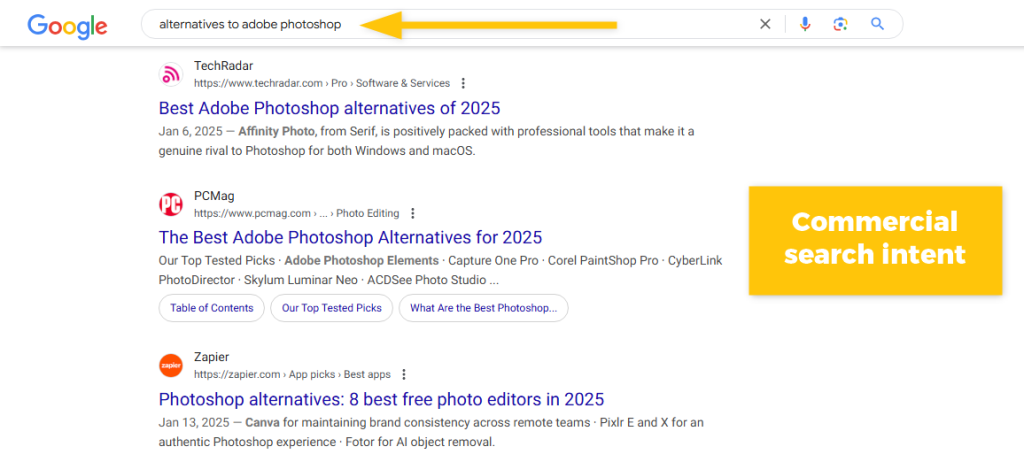
💡 Key takeaway: Content targeting commercial intent should focus on providing comparisons, reviews, or information that helps users evaluate their options before making a final purchase decision. This can include product descriptions, features, or price comparisons.
Transactional intent
Transactional keywords indicate that the user is ready to take an action, typically involving a purchase.
These are the most valuable keywords for e-commerce businesses because they directly lead to conversions.
Transactional intent suggests a high level of intent to buy, making these keywords particularly lucrative for online stores and service providers. Typical examples of transactional queries include:
- “Buy Apple iPhone”
- “Mangools subscription”
- “Netflix discount”
- “Cheap laptops for sale”
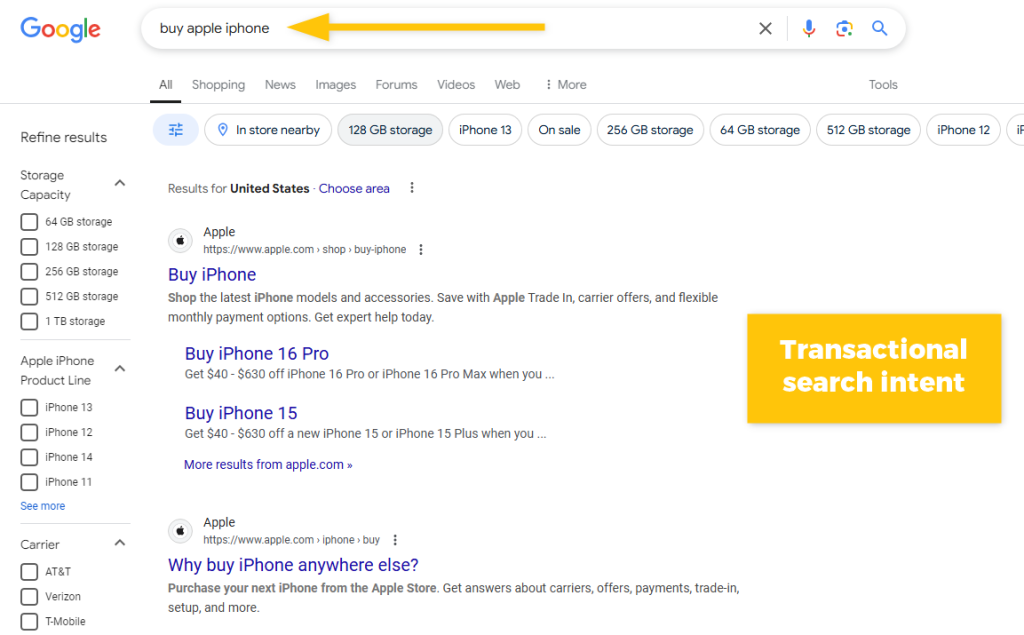
💡 Key takeaway: Content optimized for transactional intent should focus on facilitating conversions. This includes clear calls to action, persuasive product descriptions, special offers, and easy access to the checkout process.
Navigational intent
Keywords with navigational intent are used by users who are specifically trying to reach a particular website.
Instead of typing the full URL into the address bar, users search for the brand or website name in Google.
For example, instead of typing “facebook.com,” a user might search for “Facebook” to directly access the platform. This type of search is typically associated with well-known brands or specific websites.
Navigational keywords are generally easy to rank for because they directly relate to your brand.
There is little point in trying to rank for competitor keywords in this category, as the click-through rate (CTR) for non-branded results is usually low.
Typical examples of navigational queries include:
- “Facebook login”
- “Google Search Console”
- “Mangools”
- “Amazon homepage”
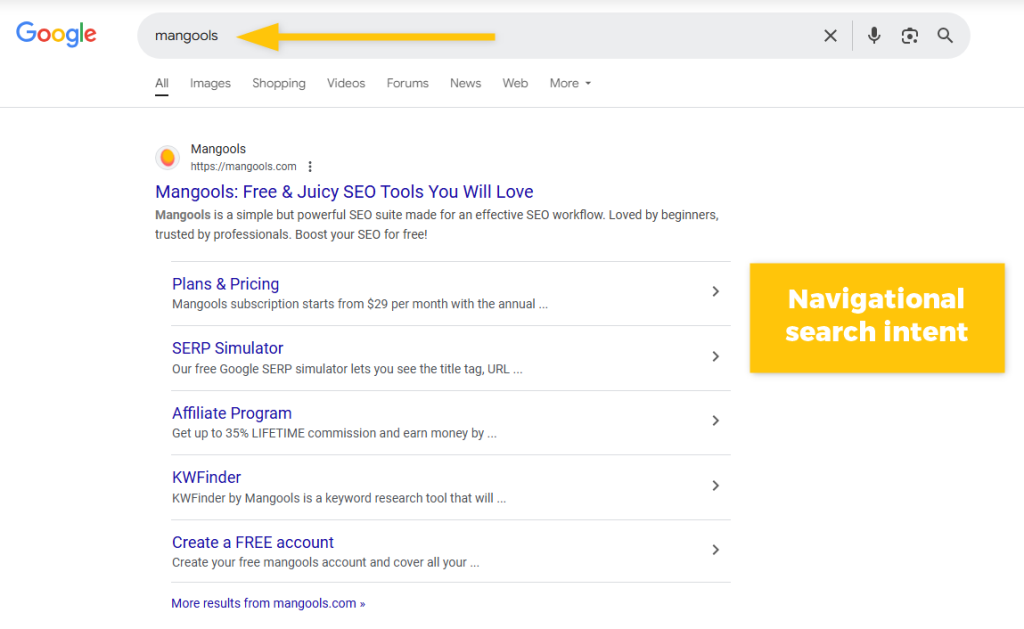
💡 Key takeaway: Navigational intent is about guiding users directly to your website or platform. For SEO, it’s essential to ensure that branded keywords are well-optimized and lead to the correct destination, whether it’s a homepage, login page, or specific service.
Mixed search intent
Mixed search intent refers to queries where a user’s intent is a blend of two or more types.
This often occurs in searches where users are still gathering information but are also interested in transactional aspects.
For example:
- “Best laptops for students under $1000” could combine both informational (to learn about laptops) and transactional (to eventually buy) intent.
- “Best running shoes 2025 reviews” might have both informational and commercial intent, where the user wants detailed information and options to make a purchase.
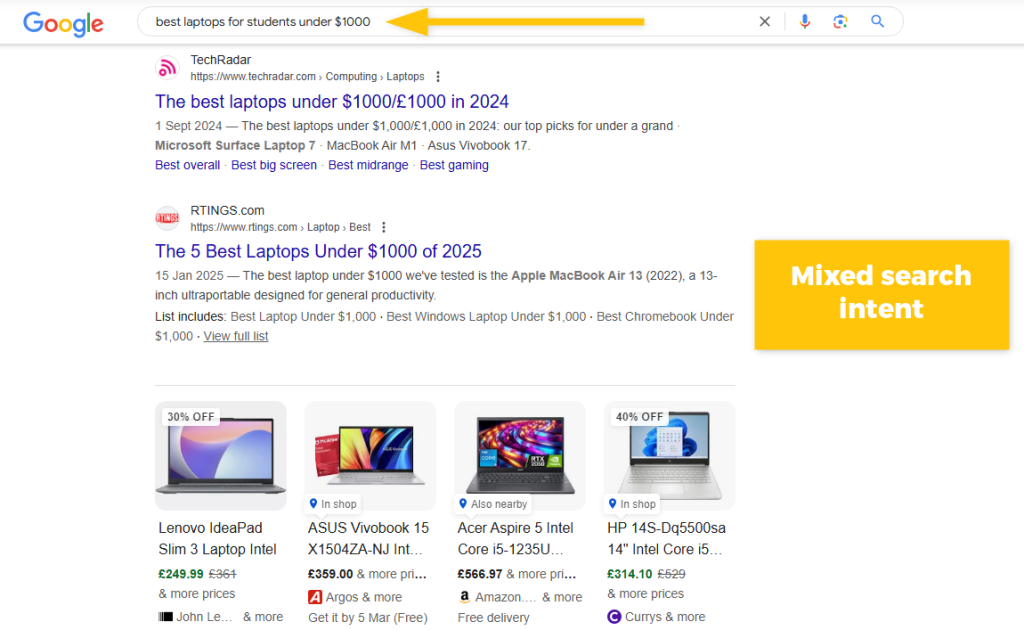
💡 Key takeaway: Understanding mixed search intent can help you create content that serves multiple purposes. Your content should cater to both informational needs (such as reviews or comparisons) and commercial needs (such as product recommendations with buying options).
Note: In addition to the primary types of search intent mentioned above, there are variations depending on the user’s needs and location.
Users may add location-specific keywords to their queries to find products, services, or information relevant to their area (e.g., “coffee shop near me,” “plumber in New York”).
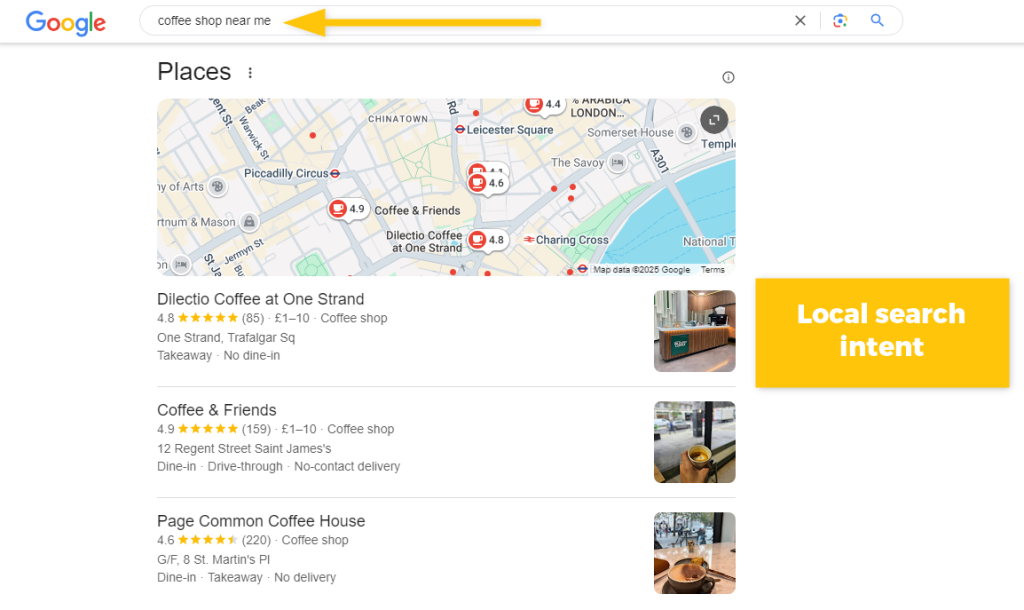
Why is search intent important in SEO?
Search intent is a crucial factor in SEO because it directly influences how search engines match content to user queries.
If you understand and try to optimize your content for search intent, you can improve your overall rankings in Google Search and ensure that your pages align with what users are actually looking for.
Here’s why search intent is so important:
a) Relevancy of search results
Search engines like Google are designed to provide users with the most relevant and accurate results for their queries.
By understanding search intent, search engines can better match web pages to user needs. If a website optimizes for the correct search intent, its content is more likely to appear in search results when users are looking for that specific type of information.
For example, if someone searches for “how to fix a leaky faucet,” they likely have informational intent. If your content is focused on providing step-by-step instructions, your page will be deemed highly relevant and more likely to rank well.
Conversely, if the same person searches for “buy leaky faucet repair kit,” they likely have transactional intent, meaning a page focused on product listings would be more relevant.
Understanding the intent behind search queries helps ensure your content serves the exact needs of your audience.
b) Content creation and optimization
By identifying search intent, you can create content that directly addresses the goals and questions of your target audience.
Content optimization becomes far more effective when you understand whether the user is looking for information, products, services, or solutions.
For example:
- Informational intent: Content should be in the form of blog posts, how-to guides, or FAQs that provide valuable answers.
- Transactional intent: Content should include product descriptions, reviews, comparisons, or landing pages designed to convert visitors into customers.
- Navigational intent: Your content should guide users to a specific page or destination, often optimized for branded searches or specific service offerings.
Optimizing for search intent ensures that your content satisfies the user’s query and meets their expectations.
This can involve using keywords that match the user’s intent and providing an answer that is structured, informative, and helpful.
c) Marketing funnel strategy
Search intent plays a critical role in shaping your marketing funnel strategy. By analyzing the intent behind keywords, you can tailor content to users at different stages of their buyer’s journey. For example:
- Top of the funnel (TOFU): Users are seeking information and solutions to problems but aren’t ready to make a purchase yet. Content like blog posts, videos, or guides that satisfy informational intent works best here.
- Middle of the funnel (MOFU): Users are evaluating options. They might be searching for comparisons, reviews, or case studies, indicating commercial or transactional intent. Optimizing content for these search queries can help position your brand as a solution to their needs.
- Bottom of the funnel (BOFU): Users are ready to make a purchase or take a specific action. Content optimized for transactional intent, like product pages, pricing pages, or calls to action, becomes more critical here.
By aligning content with the search intent of users at each stage, you can guide them through the funnel, increasing the likelihood of conversion and ensuring that your marketing efforts are both efficient and effective.
How to determine search intent?
Analyze top-ranking pages manually
You can identify the search intent behind your chosen keywords by analyzing each query and its SERP manually.
This involves evaluating the top-ranking pages for a specific keyword and understanding what type of content is being served to users.
Let’s break down the manual search intent analysis step by step.
1. Check the top-ranking pages
The first step in manual analysis is to examine the pages that currently rank at the top of the search engine results pages (SERPs).
By reviewing the organic snippets that appear, you can quickly gain a better understanding of what Google considers most relevant for that search query.
Pay attention to the following factors:
- Title tags and meta descriptions: Analyze what the snippets are about. Are they offering a product or service? Is the title focused on a comparison? Or are they phrased in a question format?
- Topic coverage: Does the content on top-ranking pages address a specific question, provide comprehensive information, or is it more of a landing page with a product description?
- User engagement signals: Consider how interactive the pages are. Do they feature embedded media, comment sections, or calls to action?
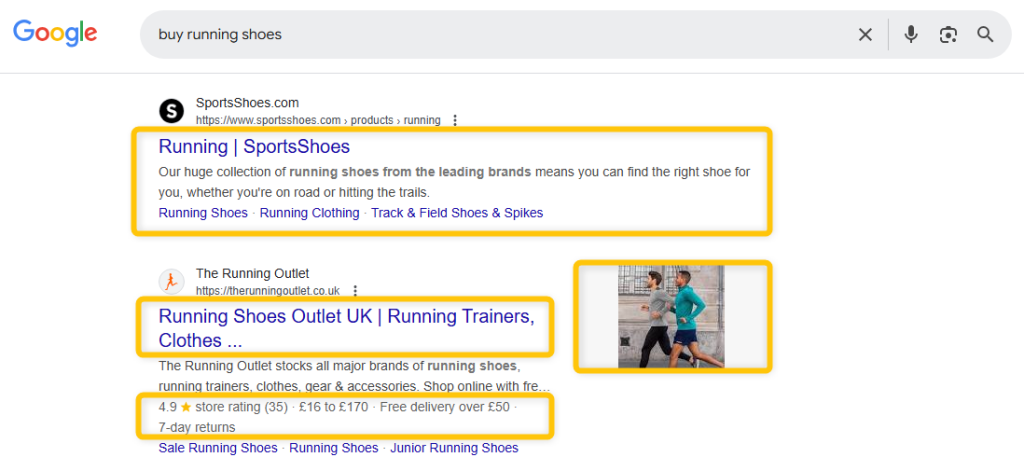
By examining these factors, you can identify the search intent behind the query and determine the type of content most likely to rank well.
2. Identify content type
Once you’ve reviewed the top-ranking pages, you can identify the content type that works best for the search query. Different types of search intent correspond to different kinds of content:
- Informational intent: Blog posts, tutorials, FAQs, and guides are common for informational queries.
- Commercial intent: Comparison articles, product reviews, or curated lists of options.
- Transactional intent: E-commerce product pages, service landing pages, or checkout pages.
- Navigational intent: Brand-specific pages or homepages for popular websites.
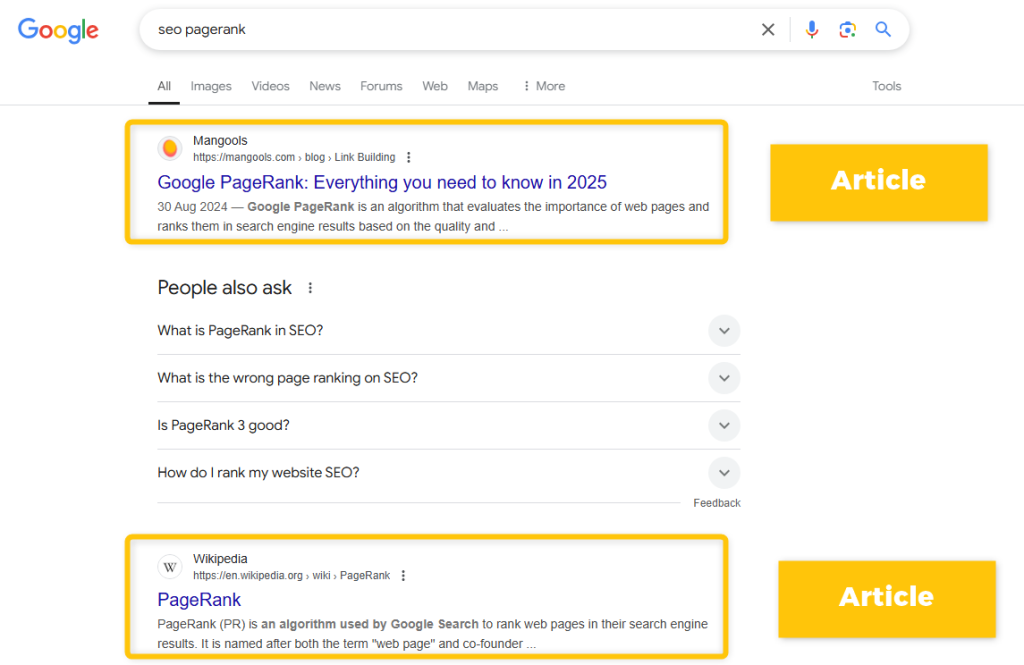
By understanding the content type that ranks well for a given keyword, you can tailor your own content to match the user’s intent.
3. Perform SERP analysis
To dig deeper into search intent, conduct a SERP analysis for your target keyword. A thorough SERP analysis reveals which types of content Google is prioritizing for a given search query and why. Consider the following steps:
- Review featured snippets: Check for highlighted content such as featured snippets, knowledge panels, or “People Also Ask” boxes. These can indicate the type of content users are looking for.
- Examine the search results page: Look at the diversity of content on the SERP. Are there a lot of product listings with review markups, videos, or informational articles? This can indicate whether the search intent is more transactional or informational.
- Analyze the ranking pages: Identify patterns in the content types of the top-ranking pages (e.g., do most results consist of in-depth guides or quick-answer posts?).
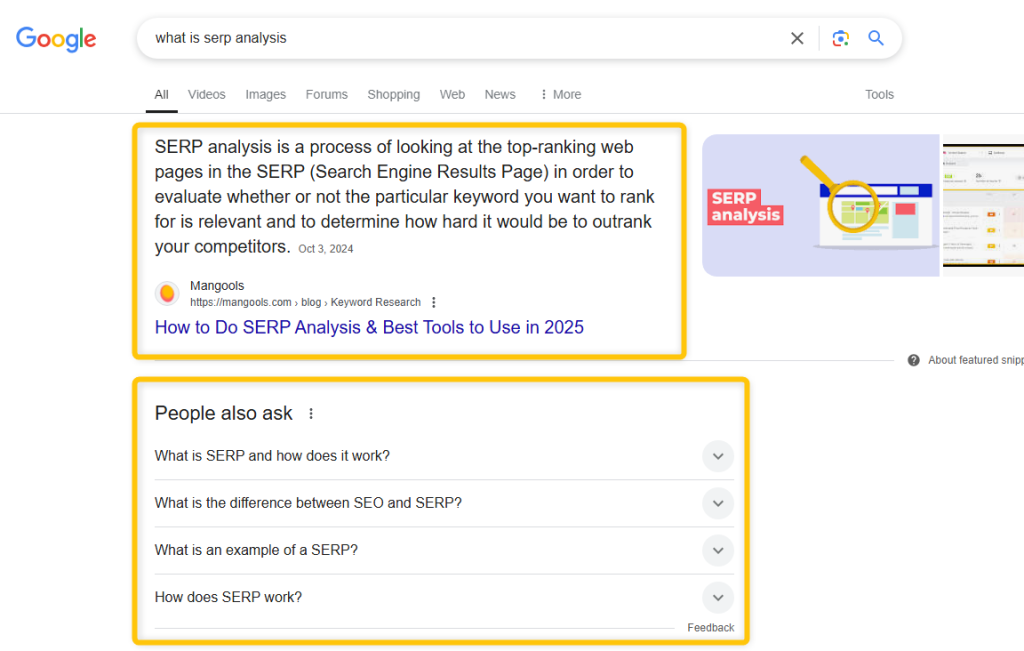
By performing a comprehensive SERP analysis, you can gain a clearer understanding of search intent and how to structure your content accordingly.
However, it is important to understand that reviewing each keyword one by one can be quite time-consuming—especially if you have a large set of keywords for which you would like to rank with your website.
Use Mangools KWFinder
Mangools KWFinder is a powerful keyword research tool that can help you not only find the most important keywords for your website or business but also analyze the search intent behind them.
It will show you which keywords are most valuable for your current SEO strategy.
During keyword analysis within the tool, check the “Intent” column in the table to see the true meaning behind each keyword.
Each major search intent type is displayed by its unique letter icon: “I” for informational, “C” for commercial, “T” for transactional, and “N” for navigational.
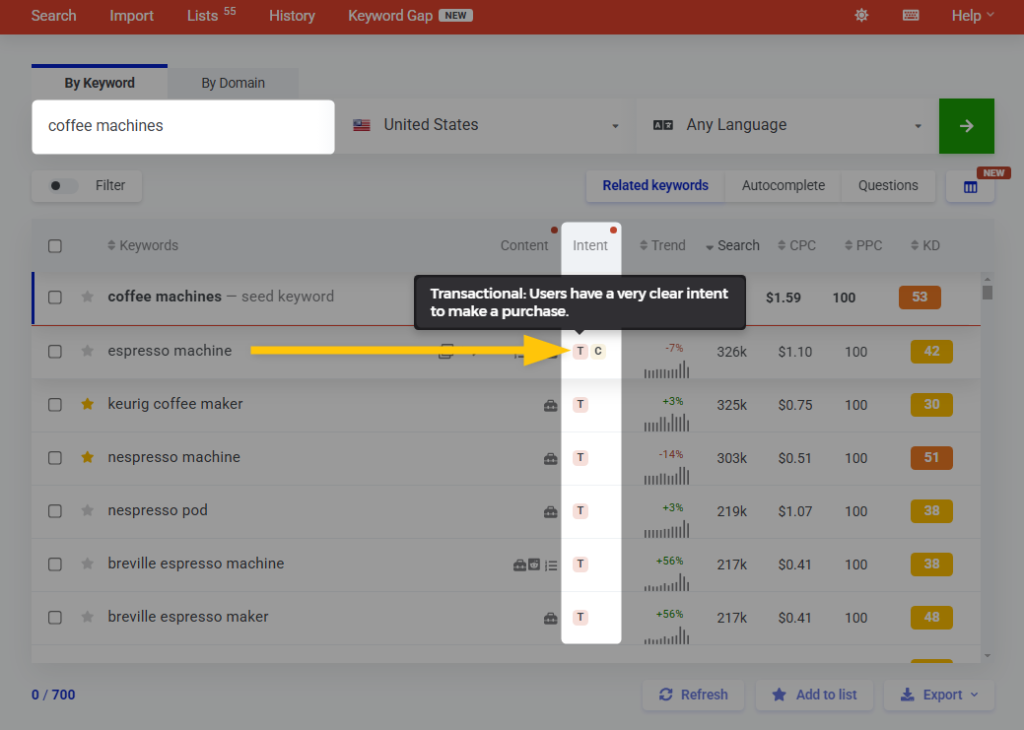
This feature will help you speed up your keyword analysis and provides valuable insights into each relevant query in your keyword cluster.
If you are looking for relevant keywords with a specific search intent, you can quickly filter out irrelevant queries and see only those that are most valuable to you. To do this, simply:
- Enter your seed keywords into KWFinder.
- Click on the “Filter” option.
- Select the search intent type or choose multiple types at once (depending on what you are looking for).
KWFinder will then process all the relevant keywords and show you those that match your chosen search intent.

In addition, you can perform in-depth search intent analysis by reviewing the content type ranking for each keyword in your chosen cluster.
The “Content” column within the table will show you what type of pages (and content) are ranking at the top of each SERP (e.g., product and service pages, guides, tool pages, forum threads, etc.).
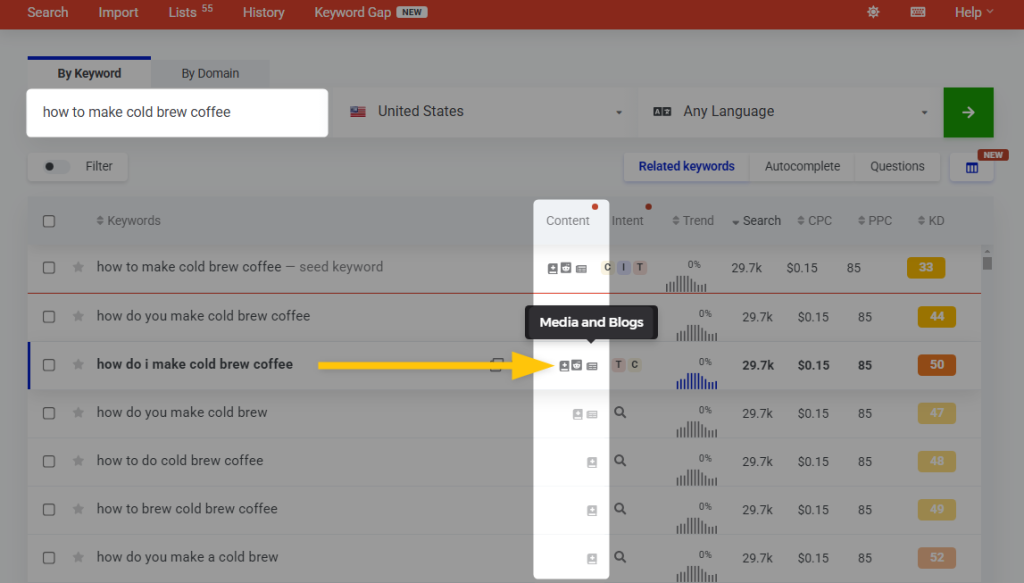
This plays a crucial role in search intent analysis, as it helps you understand what type of content you should create to rank for a specific keyword.
If you want to create only a specific type of content (e.g., comprehensive blog posts or guides) on your website but you are unsure which keywords to target, you can use the filter option to select your preferred content type.
The “Content type (TOP5 ranking URLs)” filter allows you to choose from 30+ content types and find keywords that align with your preferred content format.

Tip: You can also use our free Reddit Thread Finder to quickly identify keywords for which Google favors content in the form of Reddit threads.

Our free Reddit keyword research tool will help you determine if there’s an opportunity to rank for a specific keyword by creating and leveraging unique Reddit threads.
This will allow you to promote your business and boost your online presence for your most important keywords, even outside of your website.
How to optimize pages for search intent?
Optimizing your pages for search intent is essential for improving visibility, attracting the right audience, and achieving higher rankings in search engines.
Here’s how to effectively optimize your pages to align with search intent:
1. Identify the most important keywords
The first step in optimizing your pages for search intent is to identify the most relevant and important keywords for your content.
Start by analyzing your target audience and understanding the type of queries they might use to find your product, service, or information.
You can use Mangools KWFinder to uncover popular search queries related to your industry or topic. When choosing keywords, consider:
- Relevancy: Search for keywords that are relevant to your website and niche in order to target the right Google audience.
- Search volume: Focus on keywords that people frequently search for, ensuring there’s enough interest.
- Search intent: Determine if the keyword is informational, commercial, transactional, or navigational, and match it with the appropriate type of content.
- Competitiveness: Analyze how competitive a keyword is and decide if you can realistically rank for it, especially if you’re targeting long-tail keywords (which are often less competitive and more specific).
2. Create a high-quality content
Content quality is key to ranking well in search engines and meeting user expectations.
Search engines prioritize high-quality content that satisfies the user’s intent. When creating content, focus on the following:
- Thoroughness: Ensure that your content fully answers the query and provides comprehensive insights. This is particularly important for informational intent keywords.
- Expertise: Aim to produce content that demonstrates authority in your niche. Include credible sources, statistics, and expert opinions.
- Engagement: Write in a way that engages the reader and keeps them on your page longer. Include multimedia such as images, videos, or infographics to enhance the user experience.
3. Cover the topic thoroughly
A key component of content optimization is ensuring that the topic is covered in depth.
Don’t just scratch the surface—dive deep into the subject matter to offer real value to the user.
This is particularly relevant for informational and commercial queries. Make sure your content:
- Answers the user’s question fully: For example, if the query is about “how to make a chocolate cake,” your content should not only provide the recipe but also offer tips, variations, and troubleshooting advice.
- Provides additional resources: Link to related articles, case studies, or guides that further enrich the user’s understanding of the topic.
4. Improve readability and UX on your pages
User experience (UX) and readability play a crucial role in SEO. Google values pages that are easy to read and navigate. Here’s how you can enhance readability and UX:
- Use headings and subheadings: Structure your content with clear, logical headings to break up text and make it easier for users to scan.
- Short paragraphs: Avoid long blocks of text. Keep paragraphs concise and to the point for better readability.
- Responsive design: Ensure your page is mobile-friendly. A significant portion of users will access your site via smartphones, so it’s vital that your site works well across all devices.
- Fast loading speed: Optimize images and reduce page load times to improve user experience and decrease bounce rates.
5. Optimize your title tags and meta descriptions
Title tags and meta descriptions are critical for on-page SEO and influencing click-through rates (CTR).
These elements should accurately reflect the content of the page while appealing to users.
- Title tags: Include the target keyword naturally in the title and make sure it’s compelling enough to draw clicks. Keep it within 60 characters so it doesn’t get cut off in search results.
- Meta descriptions: Write a brief and clear meta description that summarizes the page content while also enticing users to click.
Keep it under 160 characters, and include keywords related to the search intent.
Tip: You can use our free SERP Simulator to test and see how your titles and descriptions will actually appear as organic snippets in Google Search.
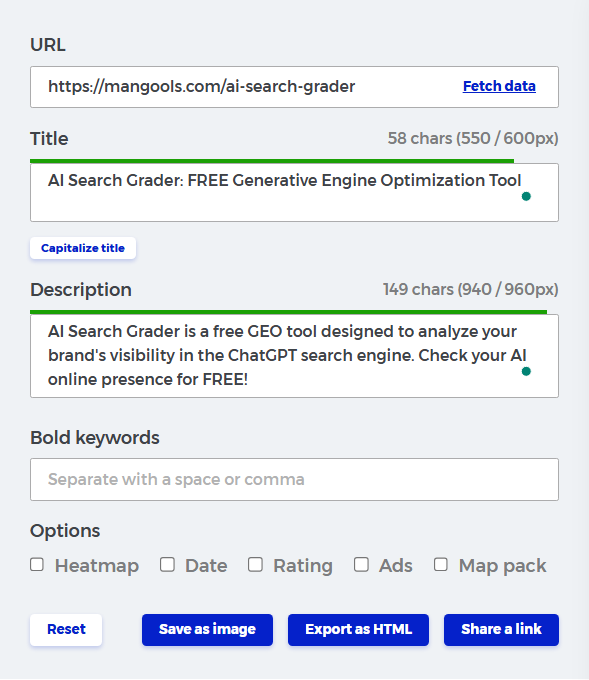
6. Consider structured data markups
Structured data (also known as schema markup) helps search engines understand the content of your page and display rich snippets in the search results.
These rich snippets can improve CTR and enhance visibility by providing additional information, such as ratings, reviews, or event details.
You can implement various types of schema, such as articles, products, reviews, recipes, and FAQs, depending on the nature of your content.
7. Monitor the performance of your pages
SEO is an ongoing process, so it’s important to regularly track the performance of your optimized pages.
Use tools like Google Analytics and Google Search Console to monitor organic traffic and conversions.
Additionally, you can use Mangools SERPWatcher to see how your pages are performing on a daily basis in Google Search.
SERPWatcher provides valuable insights into your website, including:
- Keyword rankings: The positions of your pages in Google Search for the most important keywords.
- Average positions: Track your average keyword positions within a specific timeframe.
- Estimated monthly organic visits: Get an estimate of the traffic you can expect from your chosen keywords on a monthly basis.
- Daily ranking changes: Monitor fluctuations in keyword rankings on a daily basis.
